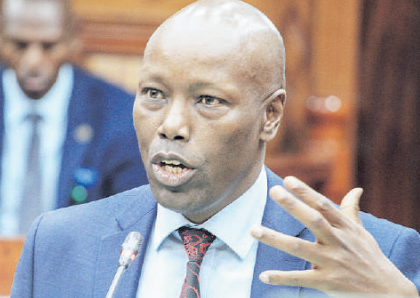
Kenya is keen to diversify its trade relations to cushion the economy from challenges such as the 10 per cent US baseline tariff on her exports, Trade CS Lee Kinyanjui has said.
This, even as he calls for increased intra-Africa trade and development of Africa’s industries to tame the export of raw materials at low prices, only for the continent to import costly finished goods from the same.
At least 25 countries in the continent, alongside Kenya, have received reciprocal tariffs in the latest of the US trade policy shift by President Donald Trump’s administration which has described the move as a declaration of economic independence.
The announcement includes additional "reciprocal tariffs" targeting specific trading partners. China faces the highest rate at 54 per cent followed by Japan at 24 per cent and the EU at 20 per cent.
Speaking at the Commonwealth Enterprise and Investment Council— Commonwealth Trade and Investment Summit in London this week, CS Kinyanjui said the country is keen to expand its offerings in trade with the globe.
This could see Kenya push for deeper ties with countries in Europe, Asia, Middle East and Latin America, even as Africa and the US remain key markets for her textile and apparel exports.
“I think as a country, we want to diversify and have more players into the market so that whenever you have one challenge such as we have today in tariffs, then the impact on the economy is minimised,” Kinyanjui said during a panel discussion.
Kenya's largest export market is Africa, with Uganda being the biggest destination, followed by Tanzania, Rwanda and the Democratic Republic of Congo.
Even so, the US tariffs are expected to impact the country’s textile and apparel sector which is the biggest exporter to the US.
Intra-Africa trade remains at a low of 14 per cent with most African countries being net importers of finished goods.
The push to drive the African Continental Free Trade Area (AfCFTA) has been faced by challenges such as poor connectivity in the continent.
“So some of the solutions we want to get must be from the continent and we must encourage our people to trade together, look for harmonised standards, look for ways and means of ensuring that if you want to raise capital, you also have institutions within Africa, including development banks, like the African Development Bank, that can be able to finance infrastructure, especially areas that are of trade facilitation in nature,” the CS said.
“On infrastructure, there is need for connectivity so that goods and services can find their way across the continent.”
He said Africa must also address the issue of raw material exports.
“It is important to note that as we look at Africa in the age to come, I think the issues of raw materials coming from the continent will also need to be looked at clearly because as countries seek to industrialise, Africa holds a key because of the important rare earth minerals that are found in this region,” he said.
The annual summit (CTIS) brings together the Commonwealth business community with heads of government, senior ministers and representatives of Commonwealth governments.
Following the Commonwealth Business Forum (CBF) and Commonwealth Heads of Government Meeting (CHOGM) in Samoa last October, this year’s business-to-government summit provides a platform to advance discussion, re-focus on critical issues and ensure that Commonwealth business priorities are advanced.
Kenya is one of the Commonwealth's fastest-growing economies, with over 60 per cent of its global trade conducted with fellow Commonwealth countries.
The Kenyan government is also keen to attract investments into the country as part of its industrilisation plans.
Kinyanjui’s ministry has been tasked with doubling Foreign Direct Investments (FDIs) in the medium-term, from an annual average of $800 million (Sh103.6 billion) to at least $1.6 billion (Sh207.3 billion).











